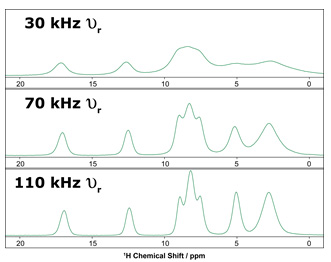Apr 11 2012
JEOL Resonance, Inc., headquartered in Akishima, Tokyo, will announce a new 0.75 mm solid state NMR probe at the 53rd Experimental Nuclear Magnetic Resonance Conference that opens on April 15, 2012 in Miami, Florida.
The probe is capable of high resolution sample analysis by spinning the sample at 110 kHz, the world's fastest spinning speed for NMR.
 1H NMR spectra of L-Histidine Hydrochloride.
1H NMR spectra of L-Histidine Hydrochloride.
The new probe is expected to be effective in applications that are difficult for conventional NMR systems, including micro analysis of drugs, natural products, and thin films.
"With this new probe, JEOL sets a new benchmark for high resolution and high sensitivity analysis of micro volumes with Solid State NMR," Robert DiPasquale, Division Manager, Analytical Instruments at JEOL USA, reports.
High Precision 1H Analysis
The unprecedented spinning speed enables high resolution 1H analysis that is not available at lower speeds. This capability allows the researcher to identify different molecular ratios, total structures in organic materials and aids in the structural analysis of proteins. Additionally it allows for high precision analysis of samples containing paramagnetic ions, such as copper binding proteins that play an important role in living organisms.
High Sensitivity Analysis of Micro Samples
The new Magic Angle Spinning capability provides high sensitivity analysis of micro samples (0.29 ìl), 1/100th of the normal sample volume, which allows for structural analysis of limited volume samples, such as natural products and thin films, and analysis of defects and degradation in localized areas of samples.
Structural Analysis
The new 0.75 Solid State NMR probe is ideal for structural analysis, including changes in properties of electrode materials in lithium ion cells after repeated charge/discharge cycles, and the structural degradation analysis of thin film materials such as organic EL and organic transistors, allowing researchers to improve the performance and durability of these products.
Measured Results
Results of solid NMR experiments analyzing the same sample using probes of different spinning speeds show that the signal peak intensities were significantly higher with the new 110 kHz probe when higher spinning speeds were used. The data acquired with the new probe were also higher in resolution, separating peaks more clearly. The new probe will help acquire detailed information on the types of atoms and the molecular structure of many substances.
JEOL Resonance strives to provide superior probes for NMR. The company introduced its first new ultra high spinning speed probe in July 2011, capable of spinning a 1 mm sample tube at an 80 kHz spinning speed, the fastest at that time.
About NMR and MAS
Nuclear Magnetic Resonance (NMR) spectroscopy applies magnetic and rf (radio frequency) fields to a sample in a magnet. The NMR spectrometer observes the nuclear magnetic resonance of the atomic nuclei in the sample as it spins at the Magic Angle (MA), and is capable of analyzing the molecular structure of the sample at the atomic level.
Effective in analyzing organic compounds and high molecular weight polymeric materials, NMR has a wide range of applications in pharmaceutical, biology, food, and chemistry. It is increasingly used in new, growing areas such as organic EL and battery films.
Magic Angle Spinning (MAS) spins a sample in an NMR magnet at an angle of 54.7° relative to the magnetic field direction. This averages out many broadening NMR interactions to greatly improve the resolution and sensitivity of the resulting NMR spectrum.